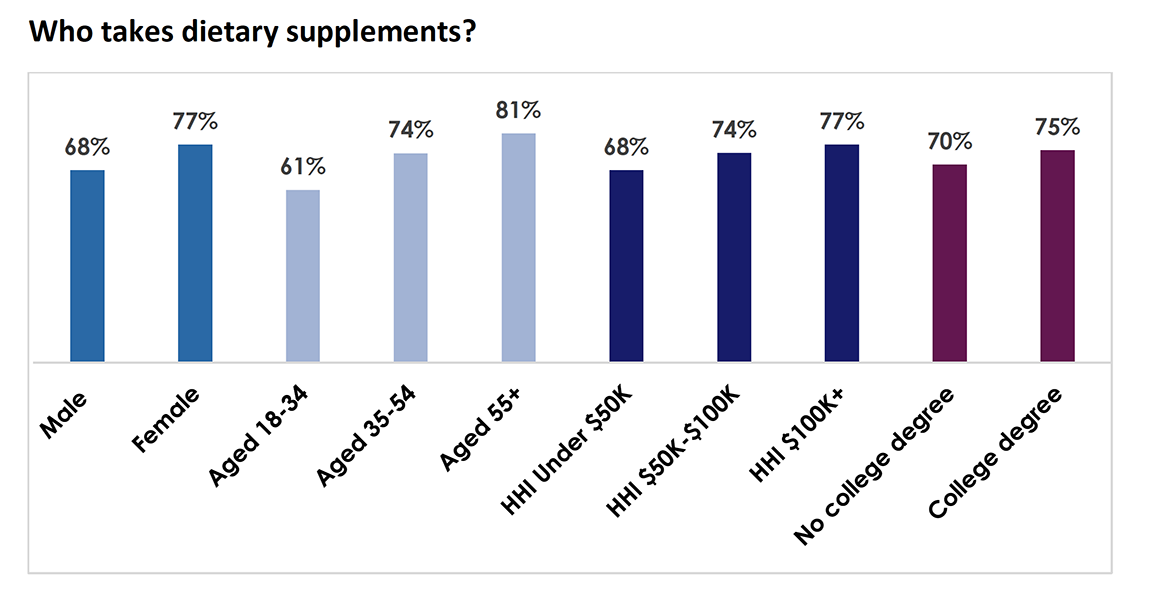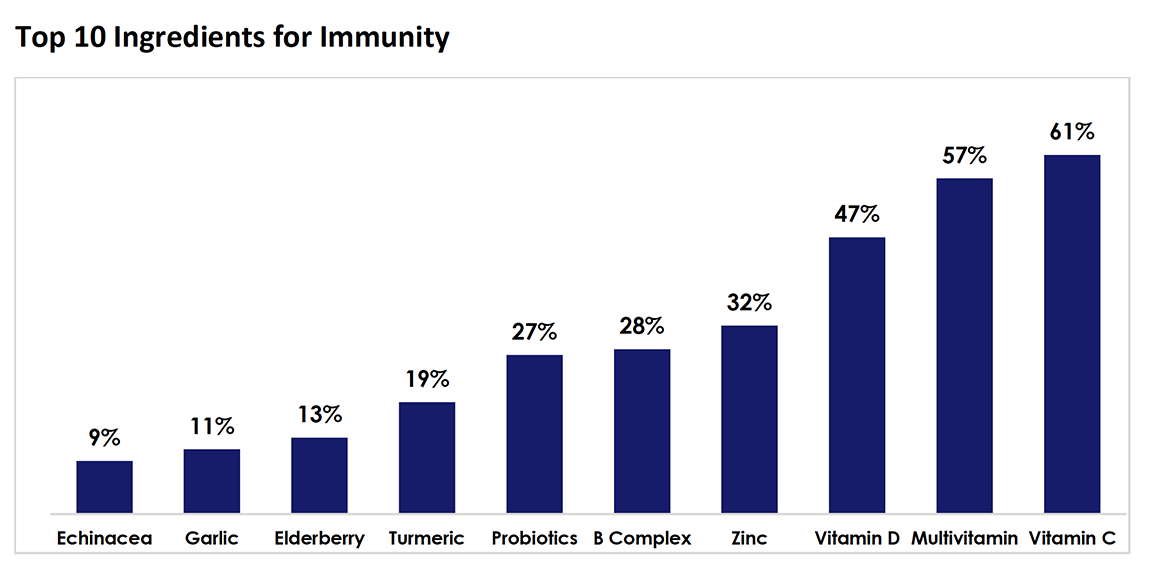09.29.20
The Council for Responsible Nutrition, a trade association representing the dietary supplements industry, issued the results of its annual consumer survey, revealing that, for the fourth year in a row, nearly three-quarters of American consumers surveyed reported taking dietary supplements.
Though this year’s 73% usage rate waned from 2019, in which 77% of consumers reported using supplements, CRN reports that it is still proximate to the data recorded in previous years (75% in 2018; 76% in 2017), and is still reflective of an upward increase since 2015 (71% in 2016; 68% in 2015).
Since the start of the pandemic, two in five (43%) supplement users reportedly changed their supplement routine, with 91% of this subset indicating they increased their intake in some way. So, despite the dip in overall usage compared to last year’s survey, the results of this survey, along with increases in sales market data, show that a substantial segment of supplement users are taking more products—either by adding new supplements to their regimen, increasing dosages and/or frequency of usage, especially within the vitamin and mineral category.
“When factoring in all survey variations, the ongoing pandemic, and viewing the data in the context of the last recession (64% in 2008 and 65% in 2009) four percentage points is not a major decline,” Chris Jackson, senior vice president of public affairs at Ipsos, said. “Other recently-conducted surveys demonstrate that Americans are continuing to practice social distancing behaviors, and some continue to experience furloughs or work suspensions and to struggle affording household goods. All of these factors could be tied to limited retail access to supplements for consumers, sustained behavior changes causing consumers to feel less of a need for specialty supplements, and less disposable income to purchase products overall.”
CRN said the high supplement usage among Americans reflects behavioral attitudes regarding confidence and trust in the industry, trust in doctors and primary care physicians, and healthy habits from supplement users versus non-users.
Today’s Supplement Users
The most likely users of supplements appeared to be females, consumers 35 years and older, those with a higher household income, and people a college degree. When consumers were asked their reasons for taking dietary supplements this year, data demonstrate that supporting immune health is a more prominent reason than before. While overall health and wellness benefits remains the most cited reason to take supplements by all users (40%) immune health overtook energy as the second most popular reason, with 32% citing this factor as why they take supplements, an increase from 27% the previous year. Immune support was the most popular driver for usage in users between the ages of 18-34 (38%). Following immune support, the next most prevalent motives for usage were to fill nutrient gaps in their diet (25%) support heart health (23%), and for hair, skin, and nails (22%).
Vitamins and minerals continue to be the most frequently mentioned supplement category with consumers, with 98% of supplement users reporting usage in the past year. However, usage has dipped for niche ingredients and categories. Specialty supplements decreased to 42% from 52% in 2019, herbs and botanicals dropped to 44% from 50% in 2019, and sports nutrition supplements dropped to 30% from 36% in 2019. The weight management category remained relatively steady, at 19% of users reporting use of products in this category compared to 22% last year.
“We’ve witnessed from CRN’s COVID-19 survey that the pandemic has not only encouraged the majority of Americans to be more conscious of their health and wellness, but the crisis has also forced consumers to adapt to the current reality and change some of their previous lifestyle behaviors,” Brian Wommack, senior vice president, communications at CRN, said. “Results from the 2020 survey continue to demonstrate an intensified focus on ingredients to support overall health and wellness and immunity. More consumers are working from home, avoiding the gym, experiencing shopping restrictions and juggling financial difficulties. So while we are witnessing dips for niche ingredients and categories, usage is steady among vitamin and mineral supplements, signaling an intensified focus on ingredients to support overall health and wellness.”
This year’s survey also included more questions about probiotics and delivery form preferences. Data from the survey was collected between August 27-31 by market research company Ipsos, through an online survey of a national sample of 2,006 adults, 1,471 of which reported to be dietary supplement users. The poll has a credibility interval of plus or minus 2.5% for all respondents, and plus or minus 2.9% for supplement users, CRN reports.
CRN members and non-members alike are able to purchase the results of the latest CRN Consumer Survey on Dietary Supplements here.
Though this year’s 73% usage rate waned from 2019, in which 77% of consumers reported using supplements, CRN reports that it is still proximate to the data recorded in previous years (75% in 2018; 76% in 2017), and is still reflective of an upward increase since 2015 (71% in 2016; 68% in 2015).
Since the start of the pandemic, two in five (43%) supplement users reportedly changed their supplement routine, with 91% of this subset indicating they increased their intake in some way. So, despite the dip in overall usage compared to last year’s survey, the results of this survey, along with increases in sales market data, show that a substantial segment of supplement users are taking more products—either by adding new supplements to their regimen, increasing dosages and/or frequency of usage, especially within the vitamin and mineral category.
“When factoring in all survey variations, the ongoing pandemic, and viewing the data in the context of the last recession (64% in 2008 and 65% in 2009) four percentage points is not a major decline,” Chris Jackson, senior vice president of public affairs at Ipsos, said. “Other recently-conducted surveys demonstrate that Americans are continuing to practice social distancing behaviors, and some continue to experience furloughs or work suspensions and to struggle affording household goods. All of these factors could be tied to limited retail access to supplements for consumers, sustained behavior changes causing consumers to feel less of a need for specialty supplements, and less disposable income to purchase products overall.”
CRN said the high supplement usage among Americans reflects behavioral attitudes regarding confidence and trust in the industry, trust in doctors and primary care physicians, and healthy habits from supplement users versus non-users.
Today’s Supplement Users
The most likely users of supplements appeared to be females, consumers 35 years and older, those with a higher household income, and people a college degree. When consumers were asked their reasons for taking dietary supplements this year, data demonstrate that supporting immune health is a more prominent reason than before. While overall health and wellness benefits remains the most cited reason to take supplements by all users (40%) immune health overtook energy as the second most popular reason, with 32% citing this factor as why they take supplements, an increase from 27% the previous year. Immune support was the most popular driver for usage in users between the ages of 18-34 (38%). Following immune support, the next most prevalent motives for usage were to fill nutrient gaps in their diet (25%) support heart health (23%), and for hair, skin, and nails (22%).
Vitamins and minerals continue to be the most frequently mentioned supplement category with consumers, with 98% of supplement users reporting usage in the past year. However, usage has dipped for niche ingredients and categories. Specialty supplements decreased to 42% from 52% in 2019, herbs and botanicals dropped to 44% from 50% in 2019, and sports nutrition supplements dropped to 30% from 36% in 2019. The weight management category remained relatively steady, at 19% of users reporting use of products in this category compared to 22% last year.
“We’ve witnessed from CRN’s COVID-19 survey that the pandemic has not only encouraged the majority of Americans to be more conscious of their health and wellness, but the crisis has also forced consumers to adapt to the current reality and change some of their previous lifestyle behaviors,” Brian Wommack, senior vice president, communications at CRN, said. “Results from the 2020 survey continue to demonstrate an intensified focus on ingredients to support overall health and wellness and immunity. More consumers are working from home, avoiding the gym, experiencing shopping restrictions and juggling financial difficulties. So while we are witnessing dips for niche ingredients and categories, usage is steady among vitamin and mineral supplements, signaling an intensified focus on ingredients to support overall health and wellness.”
This year’s survey also included more questions about probiotics and delivery form preferences. Data from the survey was collected between August 27-31 by market research company Ipsos, through an online survey of a national sample of 2,006 adults, 1,471 of which reported to be dietary supplement users. The poll has a credibility interval of plus or minus 2.5% for all respondents, and plus or minus 2.9% for supplement users, CRN reports.
CRN members and non-members alike are able to purchase the results of the latest CRN Consumer Survey on Dietary Supplements here.






























